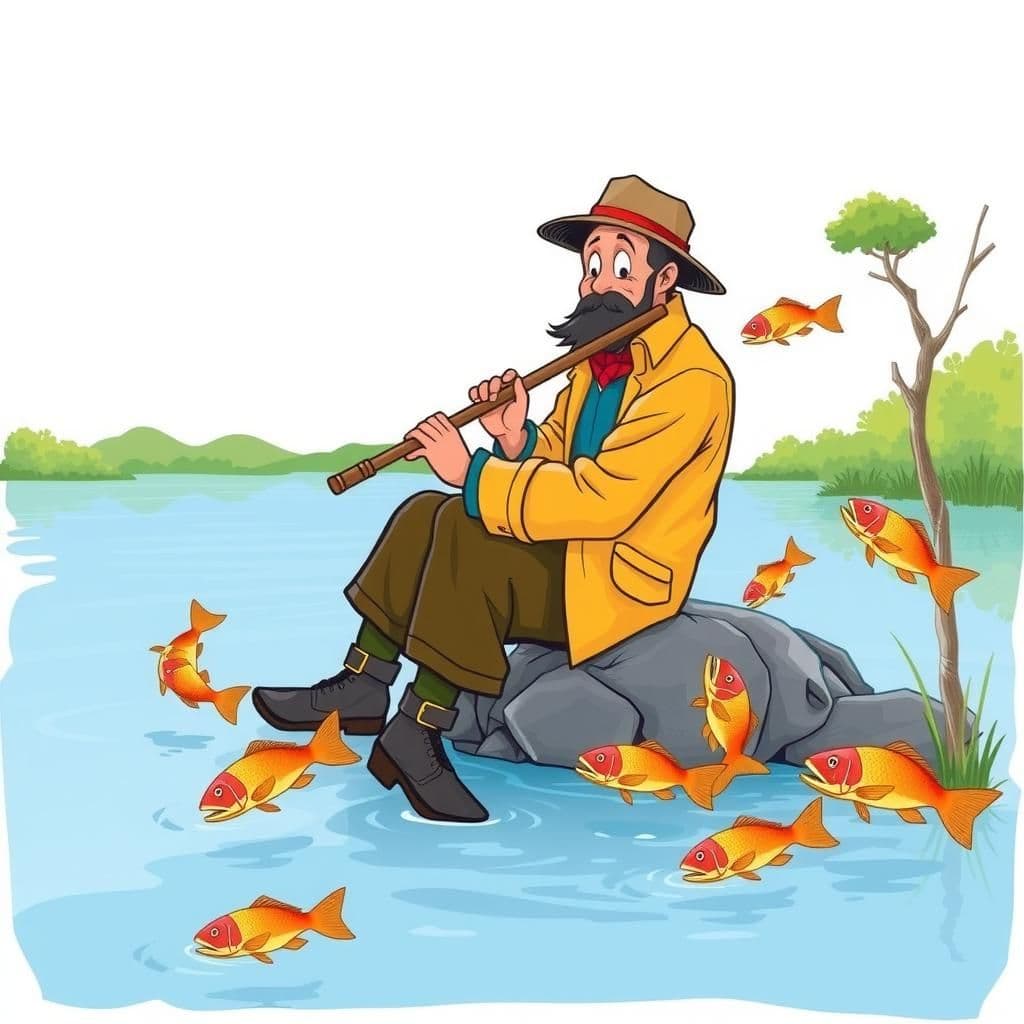The Fisherman Piping

Story Summary
A skilled fisherman, hoping to attract fish with his flute, finds his melodic efforts fruitless as the fish remain unresponsive. Frustrated, he casts his net without music and catches a great number of fish, which begin to leap joyfully. This short moral story highlights the irony of how the fish chose to dance only after he stopped playing, reflecting the theme often found in moral stories for class 7 about the unpredictability of behavior and the nature of desire.
Click to reveal the moral of the story
The moral of the story is that relying solely on charm or entertainment may not yield results, and sometimes taking direct action is necessary to achieve one's goals.
Historical Context
This story echoes themes found in Aesop's Fables, particularly the idea of effort versus reward and the folly of expecting results from passive actions. The tale reflects cultural beliefs in ancient Greece about the interplay between nature and human endeavor, illustrating that while music and art have their place, practical actions often yield more tangible results. The moral underscores the futility of relying on charm alone to achieve one's goals, a lesson resonating across various cultures and retellings throughout history.
Our Editors Opinion
This story highlights the importance of action over waiting for opportunities to come to us, a lesson that resonates in modern life where individuals often rely on passive approaches rather than proactive efforts. For instance, a job seeker who endlessly updates their resume but neglects to network or apply for positions may find themselves frustrated, much like the fisherman waiting for fish to respond to his music instead of casting his net.
You May Also Like

Six and One
In "Six and One," a Committee on Gerrymander, consisting of six Republicans and one Democrat, loses a poker game, leading to the Democrat winning all the money. The next day, a disgruntled Republican accuses the Democrat of cheating, claiming that disasters always occur when the minority is dealing, suggesting the cards were manipulated. This short and sweet moral story highlights the absurdity of blame and the lessons of fairness, making it a heartwarming tale for kids about integrity and accountability.

A Transposition
In this humorous story with a moral, a Jackass and a rabbit engage in a debate over their sizes, each convinced the other is larger in their category. Seeking resolution, they turn to a clever Coyote who diplomatically affirms their claims, illustrating the folly of their misidentifications. Pleased with his wisdom, they decide to support him for a leadership position, leaving the outcome uncertain but highlighting a life-changing lesson on perspective and self-awareness.

The Expatriated Boss
In "The Expatriated Boss," a boss in Canada is confronted by a Montreal citizen who accuses him of fleeing to escape prosecution. The boss defends his choice of Canada, citing its corrupt political environment, leading to an emotional reconciliation that highlights the themes of understanding and forgiveness. Through this simple moral story, readers are reminded of the importance of perspective and compassion, making it an educational moral story suitable for kids.
Other names for this story
Melody of the Sea, The Piping Fisherman, Harmonies of the Ocean, Fisherman's Tune, Dance of the Fish, Notes by the Shore, The Flute and the Net, Musical Catch
Did You Know?
This story illustrates the theme of the futility of relying on passive methods to achieve one's goals; the fisherman discovers that action and effort, rather than mere persuasion or artistry, lead to success, as the fish only dance after he stops playing.
Subscribe to Daily Stories
Get a new moral story in your inbox every day.